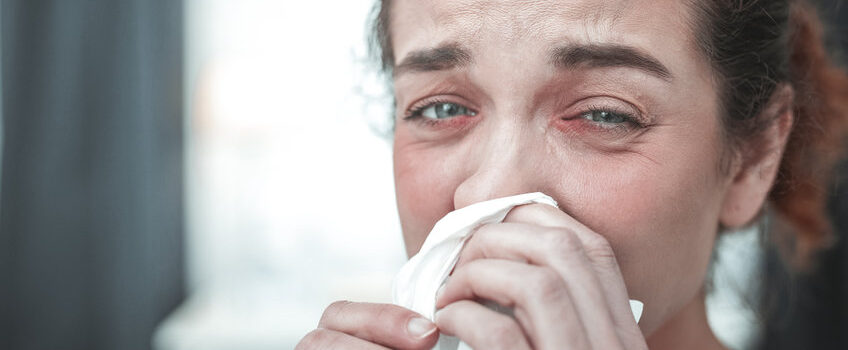The summer season is upon us; it’s the perfect time for a break away from work, exam stress, or even just the stuffy confines of the indoors. However, it can be difficult to relax and enjoy yourself if you’re suffering from itchy eyes from hay fever.
Along with beautiful weather, comes the blooming of flowers and trees sending pollen flying through the air. Warm, dry, and windy days and early in the morning when pollen counts are high can wreak havoc for people with seasonal allergies.
What causes itchy eyes?
 Allergies occur when our body’s natural defence over-react to harmless allergens such as pollen, dust and animal dander. Our immune cells, a mucous membrane covering the white surface of our eye and the inner lining of the eyelids called mast cells, then release a substance known as histamine which causes those pesky allergy symptoms, swelling and inflammation.
Allergies occur when our body’s natural defence over-react to harmless allergens such as pollen, dust and animal dander. Our immune cells, a mucous membrane covering the white surface of our eye and the inner lining of the eyelids called mast cells, then release a substance known as histamine which causes those pesky allergy symptoms, swelling and inflammation.
![]() Pollens from seasonal plants, such as grass pollens can cause hay fever or allergic rhinitis, resulting in a runny, stuffy nose, sneezing, itchy throat, sensitivity to light and red, itchy, watery eyes as well as swollen eyelids.
Pollens from seasonal plants, such as grass pollens can cause hay fever or allergic rhinitis, resulting in a runny, stuffy nose, sneezing, itchy throat, sensitivity to light and red, itchy, watery eyes as well as swollen eyelids.
Antihistamine relief for hay fever
Many hay fever suffers will visit the local pharmacy to pick up an oral antihistamine for relief. However, you need to exercise caution with use of over-the-counter oral antihistamines. While antihistamines treat hay fever by blocking the action of the histamines, helping with runny noses and sneezing, they can cause dry eyes. Reduced tears make it more difficult to flush out allergens on the eyes and they remain on the eye longer, making things worse. Dry eyes also cause burning and stinging.
Avoiding allergens
So, if your itchy eyes are caused by high pollen counts and hay fever, what can you do? The most effective way to avoid red, itchy, watery, burning eyes is to avoid pollen completely. However, if the last thing you want to do over summer is to lock yourself away indoors, shower and change clothes after any and all outside activities and keep all your doors and windows shut, we can help.
Here are some things you can do to relieve itchy eyes from hay fever:
- Wear sunglasses outside to protect your eyes from airborne allergens – this will shield them from harmful UV rays while you’re at it. Wearing wraparound sunglasses and a hat does an even better job of preventing pollen from getting onto your face and eyes.
- Wash your hands as soon as you come back inside. Showering when you get indoors also removes pollen from your skin and hair
- Avoid drying clothes outdoors.
- Remember to check Metservice’s pollen forecast.
- Don’t rub your eyes: it could make things even worse. Eye rubbing causes more histamine to be released and increases itching and the urge to rub. It can also potentially cause long-term damage.
- Place cold compresses on your eyes, for example with a cold wet towel, this can help relieve the itching sensation.
- Flush your eyes with lubricating eye drops after being outside to remove allergens. Try putting them in the refrigerator to give a cool, refreshing sensation when they are placed in the eyes.
Here’s how we can help relieve itchy eyes
- See us for artificial tears. Lubricating eye drops can remove allergens.
- We can help you out with a personalised treatment. An antihistamine-mast cell stabiliser eye drop like Patanol can be prescribed to help relieve symptoms of itchy eyes from hay fever.
If you’re experiencing red, watery, itchy eyes thanks to what you think is hay fever, you should still see one of our opticians to receive an accurate diagnosis and proper treatment. Book an appointment with your John O’Connor optometrist to check your eyes. Email our Auckland Optometrists or phone Newmarket Optometrist 09 522 1283 and Henderson Optometrist 09 836 1731.
If you’re experiencing eye pain and thick or mucus-like discharge as well as itchy eyes from hay fever, you may be dealing with something more serious so make sure you contact our eye experts as soon as you can.

